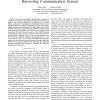Free Online Productivity Tools
i2Speak
i2Symbol
i2OCR
iTex2Img
iWeb2Print
iWeb2Shot
i2Type
iPdf2Split
iPdf2Merge
i2Bopomofo
i2Arabic
i2Style
i2Image
i2PDF
iLatex2Rtf
Sci2ools
105
click to vote
CORR
2010
Springer
2010
Springer
Information-Theoretic Analysis of an Energy Harvesting Communication System
—In energy harvesting communication systems, an exogenous recharge process supplies energy for the data transmission and arriving energy can be buffered in a battery before consumption. Transmission is interrupted if there is not sufficient energy. We address communication with such random energy arrivals in an information-theoretic setting. Based on the classical additive white Gaussian noise (AWGN) channel model, we study the coding problem with random energy arrivals at the transmitter. We show that the capacity of the AWGN channel with stochastic energy arrivals is equal to the capacity with an average power constraint equal to the average recharge rate. We provide two different capacity achieving schemes: save-andtransmit and best-effort-transmit. Next, we consider the case where energy arrivals have time-varying average in a larger time scale. We derive the optimal offline power allocation for maximum average throughput and provide an algorithm that finds the optimal power a...
Related Content
| Added | 24 Jan 2011 |
| Updated | 24 Jan 2011 |
| Type | Journal |
| Year | 2010 |
| Where | CORR |
| Authors | Omur Ozel, Sennur Ulukus |
Comments (0)

